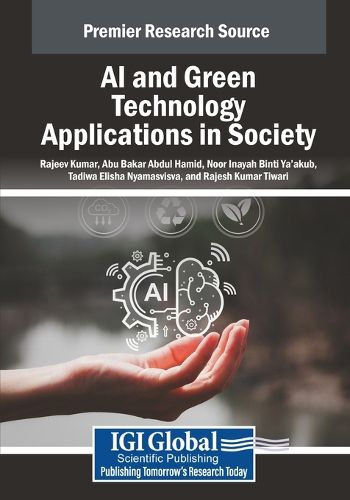Readings Newsletter
Become a Readings Member to make your shopping experience even easier.
Sign in or sign up for free!
You’re not far away from qualifying for FREE standard shipping within Australia
You’ve qualified for FREE standard shipping within Australia
The cart is loading…






This title is printed to order. This book may have been self-published. If so, we cannot guarantee the quality of the content. In the main most books will have gone through the editing process however some may not. We therefore suggest that you be aware of this before ordering this book. If in doubt check either the author or publisher’s details as we are unable to accept any returns unless they are faulty. Please contact us if you have any questions.
Artificial intelligence (AI) and green technology are increasingly intertwined, playing a critical role in driving sustainable solutions across various sectors of society. AI-powered systems optimize energy consumption by predicting demand and enhancing the efficiency of renewable energy sources like solar and wind power. In agriculture, AI enables precision farming, reducing waste, and conserving resources by analyzing soil conditions, weather patterns, and crop health. Additionally, AI contributes to the development of smart cities, where it helps reduce carbon emissions through traffic optimization, energy-efficient buildings, and sustainable waste management. Combined with green technologies, AI accelerates innovation, fostering a more sustainable and eco-conscious society. AI and Green Technology Applications in Society explores the intersection of AI and sustainable technologies, detailing how AI is driving innovation in environmental conservation and energy efficiency. It further delves into ethical implications, challenges, and the future potential of integrating AI with green technologies to promote a sustainable and eco-friendly future. Covering topics such as climate change, precision agriculture, and smart cities, this book is an excellent resource for AI researchers, policymakers, sustainability professionals, academicians, graduate and postgraduate students, and more.
$9.00 standard shipping within Australia
FREE standard shipping within Australia for orders over $100.00
Express & International shipping calculated at checkout
This title is printed to order. This book may have been self-published. If so, we cannot guarantee the quality of the content. In the main most books will have gone through the editing process however some may not. We therefore suggest that you be aware of this before ordering this book. If in doubt check either the author or publisher’s details as we are unable to accept any returns unless they are faulty. Please contact us if you have any questions.
Artificial intelligence (AI) and green technology are increasingly intertwined, playing a critical role in driving sustainable solutions across various sectors of society. AI-powered systems optimize energy consumption by predicting demand and enhancing the efficiency of renewable energy sources like solar and wind power. In agriculture, AI enables precision farming, reducing waste, and conserving resources by analyzing soil conditions, weather patterns, and crop health. Additionally, AI contributes to the development of smart cities, where it helps reduce carbon emissions through traffic optimization, energy-efficient buildings, and sustainable waste management. Combined with green technologies, AI accelerates innovation, fostering a more sustainable and eco-conscious society. AI and Green Technology Applications in Society explores the intersection of AI and sustainable technologies, detailing how AI is driving innovation in environmental conservation and energy efficiency. It further delves into ethical implications, challenges, and the future potential of integrating AI with green technologies to promote a sustainable and eco-friendly future. Covering topics such as climate change, precision agriculture, and smart cities, this book is an excellent resource for AI researchers, policymakers, sustainability professionals, academicians, graduate and postgraduate students, and more.